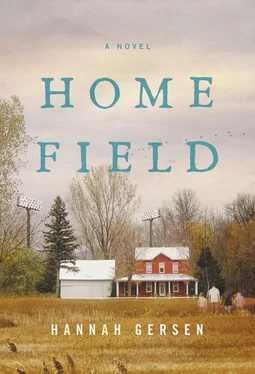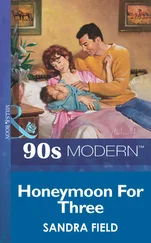“You don’t have to be sorry.” Dean sat down next to him. The ground was still a little bit wet from the morning’s dew.
“You’re really not mad?”
Dean shook his head.
“Stephanie seems mad.”
“She’s mad at me,” Dean said, “not you.”
“Why isn’t she at school?”
“What’s going on with you?” Dean searched his son’s face for some clue of what motivated him. He still had a babyish profile, round cheeks and soft, wispy hair.
“Nothing much.” Robbie plucked one of the taller grasses and began to tie it into a knot.
“There’s a lot of new kids, right? Have you made new friends?” Dean said. The middle school was large, bringing together the graduating classes of four littler elementary schools.
“Not really,” Robbie said. “Everybody sticks with the people they already know.”
“What about joining an intramural team? You could try out for soccer,” Dean said. Soccer was the only sport Robbie had ever mentioned.
“Actually, I tried out for The Wizard of Oz . They had auditions in my chorus class because they need a bunch of kids to be munchkins.”
“Wait, you tried out for the high school play?” Dean said.
“Yeah, and I got the part!” Robbie couldn’t help grinning as he spoke. “I’m going to be a munchkin — and a flying monkey and a poppy flower. And I’m singing in the chorus.”
“Okay,” Dean said. The parts sounded silly to him, more suited to Bryan, but Robbie was obviously proud.
“What’s the matter?” Robbie said. “You don’t want me to be in the play?”
“It’s not that.”
“You think I should play a sport.”
“I think you should be with people your own age,” Dean said.
“They don’t do a play in middle school,” Robbie said. “And I like older kids. I don’t like kids my age.”
“You might if you got to know them.”
Robbie shrugged. “I don’t want to play soccer. I’m not good at it. No one’s good at it. It’s boring to do something that no one’s good at. And everyone’s bad at everything in middle school. I’d rather be around older kids who know how to do things. What’s wrong with that?”
“Nothing,” Dean said. He worried that Robbie’s longing for older kids had to do with Stephanie’s absence, and that his desire to playact, to live in fantasy, had to do with Nicole’s death.
“The rehearsals are pretty much every day after school,” Robbie said. “So I’ll be out of your way.”
“You’re not in my way.”
“The stage is so big,” Robbie said. “My friend Mark was in The King and I in fourth grade. He was Anna’s son. Do you remember that? He stood on the side stage, and they made it look like a boat.”
Dean had no memory of this performance. He’d accompanied his children through the world, and yet sometimes it seemed to him as if he had no way of knowing what really mattered to them.
He stood up and brushed the grass off his shorts. “Come on, let’s go home — okay?”
Back at the car, they found Stephanie and Bry listening to the radio with the windows down. Stephanie was flipping through the folder of running stuff he had taken from his office.
“You left this on the roof of the car,” she said, handing it to him.
“Thanks.” He stuffed it under his seat.
“I’m going back to school as soon as we get home.”
“Sounds good to me,” Dean said, starting the car.
He exited campus the back way, behind the middle school, so he wouldn’t have to go past the football field. He didn’t want to see the team practicing. And he couldn’t bear to observe local etiquette, honking his horn as he drove past. They would recognize his car and wonder where their old coach was going. Or maybe they wouldn’t wonder. Maybe they would just wave, and get back to their training.
The next morning Dean awakened early from a disturbing dream. He and Laura were on his bed, which was strewn with Nicole’s clothes. She undressed, revealing breasts that were like Nic’s. “You’re too young,” Dean said. He meant she was too young for breasts like that, breasts that had borne the weight of three pregnancies, but she thought he was trying to push her away. She began to cry and then she became Nicole, who put her hands on his face and said, “Didn’t you want her all along?”
It was Sunday, a day for sleeping in, but when Dean closed his eyes, his just-shed dream netted him again, Nicole’s soft voice in his ear. He flung it away, swung his feet to the floor, and pushed back the curtain on the window. The sun was rising, its pale light beginning to fade the stars.
He checked on the boys. They both slept on their stomachs. Bryan still had a lovey, a stuffed giraffe whose long neck got into odd positions at night. This morning the giraffe was pushed off to the side, lying facedown near the edge of the mattress. Nicole used to say it was keeping watch for monsters.
Stephanie’s room was empty, untouched. Her bed was still neatly made with the sheets Dean had washed before her arrival. She’d never even slept on them.
He’d called her dorm room yesterday night, but she wouldn’t talk to him. Her roommate, a meek-sounding girl who addressed him as Mr. Renner, picked up. There was a muffled pause after Dean asked for Stephanie and then the same soft voice said she was sorry, Stephanie wasn’t around after all. Dean didn’t push back against the lie. Now that she’d seen him in the bar, she had a reason for her anger, a point to focus on. Dean hated to think of the stories she was concocting.
When it came to Laura, he wasn’t even sure what the real story was anymore.
It was too early to wake up the boys, so he decided to go for a jog. He had to get in better shape if he was going to keep attending races. Outside the air was cool and soft. In the dim light, everyone’s backyard gardens were abundantly and deeply green, with their tall rows of corn and sunflowers, and their bean plants and tomatoes climbing chicken-wire cages. Small piles of freshly pulled still-green weeds lay around the perimeter of each garden, evidence of industrious Saturdays. Dean felt virtuous just looking at them.
His heart was beating hard to match his foot strikes. He was going fast, maybe. Or maybe he was tired. He decided to run all the way to Iron Bridge, or rather, the ugly cement thing that had replaced it. Dean’s thighs burned as he made his way up the hill that preceded the bridge. His thoughts burned away, too. When he reached the top, he was breathing with a ragged intensity that reminded him of being young. Holding on to that glimmer, he ran hard down the hill, toward the creek, letting gravity lengthen his stride. The pain increased, and by the time he reached the bridge he had to stop. He looked down at the water flowing past and then checked his pulse, timing how long it took for his breath to return to normal. He recalled the agony of running when he first started training in the summers, as a teenager. The sharp stitches at the side of his waist. The weight of his lungs. He used to smoke then, taking a dizzy hit of nicotine after workouts. Then he would douse his face and hair with the garden hose, the water warm at first and then icily cold. In the nearby fields, his father would hose down the horses until their short-haired bodies gleamed like metal. Looking back on that time, it was like his life was one physical sensation after another, with time stretching to contain them all in one unbroken chain. And yet he was impatient to break free, to move away, to become a man, whatever that meant.
He hurried home, worried that the boys would wake up and find him gone.
But they were still asleep when he got back. He stretched on the living room carpet, listening to the radio, some nuts-and-bolts news analysis, a weekend roundup. They played a clip of President Clinton speaking at a campaign rally, hoarsely and vaguely, asking voters to consider the historical consequences of various presidencies: “Think how different this country would be if Abraham Lincoln had not been president when the states said, ‘Well, hey, we formed this country; we’ve got a right to get out.’ And then to face the next question: ‘Well, if we’re going to stay together, don’t we have to quit lying about who we are?’” The words hit Dean’s conscience like stealthy arrows. His marriage — it was built on. . what? Not lies, exactly. But not the truth, either. One of the commentators was saying that peace and prosperity were the president’s greatest assets. Dean liked Clinton but he didn’t trust him completely; he reminded Dean of the silver-haired big spenders who came to the track with their girlfriends, the ones who gambled as a way to show off how much they could afford to lose.
Читать дальше












